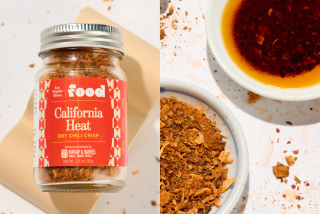Scaling Down : Marinades: Low-Cal Goes Exotic : Enhancements: It’s a world full of marinades, a world practically bursting with wild but low-cholesterol flavor combinations. It’s a small (waistline) world after all.
- Share via
One of the best ways to give food flavor without fat is by using marinades. Like sauces, marinades enhance the flavor of simply cooked meats and seafood. But they are used before cooking, not afterward. High in flavor and low in fat, marinades increase flavor without adding cholesterol to arteries or inches to the waistline. This comes as no news to cultures as diverse as Japanese, Indian and Mexican, where marinades are an integral part of the cooking.
Marinades can be used to give bland basic foods--pork chops or chicken breasts, for instance--a distinctive ethnic character. Soy sauce, ginger and sesame oil lend an Asian accent, while olive oil, lemon juice and fresh herbs evoke the flavor of the Mediterranean. Latin Americans favor a pungent blend of chiles, orange and cumin, while in India, cooks favor the piquancy of yogurt, ginger and spices.
A typical marinade has three components: acid, oil and an aromatic. The acid helps break down muscle fibers, aiding in tenderizing the meat. The oil coats the exterior of the meat, preventing it from drying out during cooking. Aromatics add flavor; in the days before refrigeration, they also acted as preservatives. All three go a long way toward improving the flavor of the fish or meat.
The acidic ingredients can range from fruit juice to vinegar, wine and soured milk products. Fruit juices might include fresh lemon juice, used in Greece; lime or sour orange juice, popular in the Caribbean; or even pomegranate juice, which is widely used in Soviet Armenia. Soured dairy products include yogurt, used in India and Pakistan, and buttermilk, used in the American South.
Oils may include olive oil and walnut oil, used throughout the Mediterranean, and sesame oil, which is favored in the Far East. When buying olive oil, extra virgin is the grade to look for. When buying sesame oil, find a brand imported from the Far East; domestic oils sold at health food stores lack the distinctive nutty flavor of Asian sesame oil.
The aromatics usually include some sort of vegetable: onion, celery, carrot and garlic, in the case of a classical French marinade; garlic, green onions and ginger in Asia. Herbs and spices are essential to any marinade. Whole spices, such as cinnamon sticks and star anise, generally have more flavor than commercially ground powders.
Similarly, fresh herbs are tastier than dried. To help release their flavor, lightly bruise them by twisting. One classic herb combination for marinades is the bouquet garni : bay leaves, thyme sprigs, parsley stems, peppercorns and a clove or allspice berry wrapped and tied in cheesecloth. If you happen to be out of cheesecloth, wrap these ingredients in a piece of foil and perforate it with a fork.
Marinades needn’t be liquid. The Berbers of North Africa, for example, marinate beef and lamb in a thick paste of garlic, ginger, paprika, coriander and chiles. Pesto makes a delectable marinade for poultry, pork and lamb.
The ingredients for a marinade are limited only to the creativity of the cook. Nonetheless, throughout the centuries, certain flavor combinations have become associated with individual foods. Seafood is enhanced with lemon, olive oil and fresh herbs, while game is almost always marinated with red wine, juniper berries and peppercorns. Poultry and beef are well served by a teriyaki-type marinade made with soy sauce, ginger and garlic.
Delicate foods, such as fish, need only an hour or so of marinating. Chicken may require two to eight hours of marinating (two hours for chicken breasts, eight hours for whole chickens), while red meats are usually marinated overnight. Be careful not to marinate the food too long, or the meat will become mushy.
Use a glass, ceramic or stainless-steel dish for marinating. Aluminum and cast iron tend to react with acids, like wine or lemon juice. It is not necessary for the food to be completely submerged in liquid, but it should be turned on a regular basis. Keep the food refrigerated for all but the last hour of marinating.
Whatever food you marinate, be sure to drain and blot it thoroughly before grilling or broiling. (Wet meat tends to stew rather than roast.)
The recipes below attest to the universal appeal of marinades. Each of the marinades below is sufficient for 1 1/2 to two pounds seafood, poultry or meat.
Teriyaki could be called the national marinade of Japan. It goes equally well with seafood, poultry and meat. Mirin is sweetened rice wine. It’s available at Asian markets and health food stores. If unavailable, use sake, Sherry or white wine and increase the sugar. The maple syrup helps round out the flavors.
TERIYAKI MARINADE
1 (1-inch) piece ginger root, peeled and minced
1 large clove garlic, minced
2 green onions, finely chopped
6 tablespoons soy sauce
1/4 cup mirin
3 tablespoons sesame oil
2 tablespoons maple syrup or 1 tablespoon sugar
Combine ginger, garlic and green onions in bowl. Stir in soy sauce, mirin, sesame oil and maple syrup. Makes enough marinade for 1 1/2 to 2 pounds lamb, chicken or shrimp.
A tandoor is an Indian urn-shaped clay oven in which marinated kebabs are grilled on vertical skewers. Some Indian restaurants add food coloring to turn this marinade Mercurochrome orange. I prefer a paler, more natural look. This marinade is particularly well suited for lamb, chicken and shrimp, which can be grilled on a barbecue if, like most people, you don’t have a tandoor.
TANDOORI MARINADE
1 (1-inch) piece ginger root, peeled and minced
3 cloves garlic, minced
1 jalapeno or other hot chile, split, seeded and minced
2 cups plain low-fat yogurt
1/4 cup lemon juice
2 bay leaves, crumbled
2 tablespoons paprika
1 teaspoon ground cumin
1 teaspoon ground coriander
1 teaspoon ground cinnamon
1 teaspoon ground turmeric
1/2 teaspoon freshly ground black pepper
1/4 teaspoon ground cardamom
Dash ground cloves
1 1/2 teaspoons salt or to taste
Combine ginger, garlic and chile in bowl. Whisk in yogurt, lemon juice, bay leaves, paprika, cumin, coriander, cinnamon, turmeric, black pepper, cardamom and cloves. Season to taste with salt. Makes enough marinade for 1 1/2 to 2 pounds lamb, chicken or shrimp.
Fenugreek is a rectangular seed with a pleasantly bitter flavor. Look for it in Indian and Middle Eastern grocery stores. I have used this marinade, characteristic of North African cooking, with great success on tuna, pork tenderloin and sirloin steak.
BERBER MARINADE
1 small onion, finely chopped
2 small cloves garlic, minced
1 (1-inch) piece ginger root, peeled and minced
2 teaspoons cracked black pepper
1 teaspoon crushed hot pepper, or to taste
1 teaspoon coriander seeds
1 teaspoon cardamom grains
1 teaspoon fenugreek seeds, optional
1/8 teaspoon ground cinnamon
1/8 teaspoon ground cloves
1/8 teaspoon ground allspice
1 tablespoon salt, or to taste
1/3 cup imported paprika
1/2 cup olive oil
Juice of 1 lemon
Combine onion, garlic, ginger, peppercorns, crushed hot pepper, coriander, cardamom, fenugreek, cinnamon, cloves, allspice, salt and paprika in dry skillet. Cook over medium heat 3 to 4 minutes, or until spices are lightly roasted and fragrant.
Combine roasted spice mixture, olive oil and lemon juice in blender and puree to smooth paste. Spread paste on meat and marinate overnight. Makes enough marinade for 1 1/2 to 2 pounds tuna, pork tenderloin and sirloin steak.
Note: A little of this spicy mixture goes a long way.
The marriage of fruit and meat is characteristic of the Caucasus region in the southern Soviet Union. This cinnamon-orange marinade is a specialty of the republic of Georgia. It is usually used with grilled chicken and game hen, but it also goes nicely with swordfish.
CINNAMON-ORANGE MARINADE FROM SOVIET GEORGIA
3 oranges
1 lemon
2 limes
2 cloves garlic, minced
1 (1-inch) piece ginger root, peeled and minced
1 medium onion, finely chopped
2 cinnamon sticks
3 tablespoons paprika
1 teaspoon sugar
1/2 teaspoon salt or to taste
1/2 teaspoon cracked black pepper
1/4 teaspoon freshly grated nutmeg
1/4 cup dry white wine
3 tablespoons canola or other vegetable oil
Remove zest from 1 orange and lemon. Juice all oranges, lemon and limes. Combine juice and zest in bowl. Add garlic, ginger, onion, cinnamon, paprika, sugar, salt, black pepper, nutmeg, wine and oil. Whisk to mix. Makes enough marinade for 1 1/2 to 2 pounds chicken, game hens and swordfish.
This spicy marinade owes its unusual flavor to the chipotle , a smoked jalapeno chile. Chipotles are usually sold canned in tomato paste. Look for them at Mexican and Latin American markets. Adobo marinade goes particularly well with pork.
ADOBO, MEXICAN SMOKED CHILI MARINADE
Juice of 3 oranges
Juice of 1 lime
2 to 3 canned chipotle chiles or to taste, finely chopped
3 cloves garlic, finely chopped
2 teaspoons crushed oregano
1/2 teaspoon cumin seeds
1/2 teaspoon black pepper
2 tablespoons wine vinegar
1/2 teaspoon salt
Combine orange and lime juices, chiles, garlic, oregano, cumin, black pepper, vinegar and salt in blender. Puree until smooth. Makes enough marinade for 1 1/2 to 2 pounds meat or chicken.


